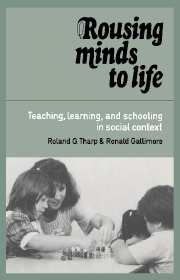Book contents
- Frontmatter
- Contents
- Acknowledgments
- Introduction
- Part I Teaching, schooling, and literacy: a unified theory of education
- Part II Practice
- 6 A school organized for teaching: the Kamehameha Elementary Education Program
- 7 The activity setting of the instructional conversation: developing word and discourse meaning
- 8 The orchestration of activity settings: learning and social interaction in the whole group and independent centers
- 9 The interpsychological plane of teacher training
- 10 Assisting teacher performance through the ZPD: a case study
- 11 The intrapsychological plane of teacher training: the internalization of higher-order teaching skills
- 12 The schools in mind and society
- References
- Author index
- Subject index
10 - Assisting teacher performance through the ZPD: a case study
Published online by Cambridge University Press: 05 June 2012
- Frontmatter
- Contents
- Acknowledgments
- Introduction
- Part I Teaching, schooling, and literacy: a unified theory of education
- Part II Practice
- 6 A school organized for teaching: the Kamehameha Elementary Education Program
- 7 The activity setting of the instructional conversation: developing word and discourse meaning
- 8 The orchestration of activity settings: learning and social interaction in the whole group and independent centers
- 9 The interpsychological plane of teacher training
- 10 Assisting teacher performance through the ZPD: a case study
- 11 The intrapsychological plane of teacher training: the internalization of higher-order teaching skills
- 12 The schools in mind and society
- References
- Author index
- Subject index
Summary
The management of activity settings and the orchestration of assistance to teachers are complex tasks, with endless opportunities for error, delay, confusion, anxiety, and all the other problems that can arise in human social transactions. Cast as a set of propositions about teacher training, the theoretical structure presented thus far has all the advantage of the “schooled” or “scientific” or “systematic” set of concepts – and all the disadvantage: “Propositions are remarkably economical in form, containing and simplifying a great deal of complexity. … They gain their economy precisely because they are decontextualized, stripped down to their essentials, devoid of detail, emotion, or ambience” (Shulman, 1986, P. 11).
The liability of this “schooled” propositional knowledge is its inability to convey how the structures and processes appear and function in concert, in particular circumstances of everyday life (Shulman, 1986, p. 11). In practice, the means and sources of assistance to teachers – in given activity settings – are inevitably concatenated and interpenetrated. Their complexities are further compounded by the personalities of the actors, the particularities of a given school, and other features of the local ecocultural niche. Knowing only the propositions of Chapter 9 would provide little assistance to any who sought to implement them.
Shulman offered one remedy for the liability of propositional knowledge: case knowledge:
A case, properly understood, is not simply the report of an event or incident. To call something a case is to make a theoretical claim – to argue that it is a “case of something,” or to argue that it is an instance of a larger class.… […]
- Type
- Chapter
- Information
- Rousing Minds to LifeTeaching, Learning, and Schooling in Social Context, pp. 217 - 248Publisher: Cambridge University PressPrint publication year: 1989



